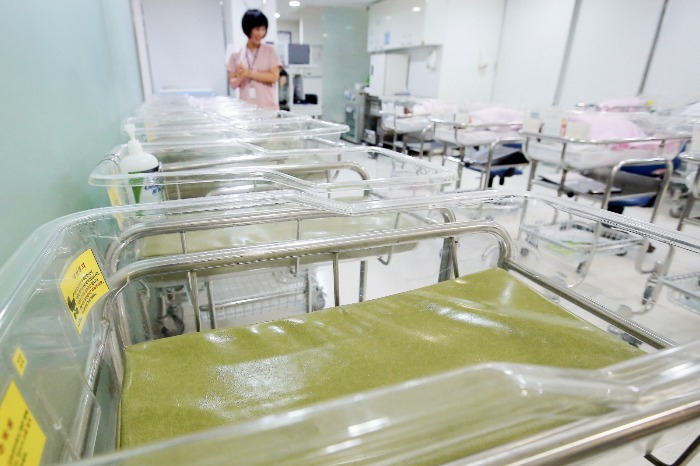Economy
S.Korea’s heated debate on domestic helpers from Southeast Asia
Asia’s fourth-largest country considers foreign domestic helpers from Southeast Asia as a solution to its free-falling fertility rate
By May 26, 2023 (Gmt+09:00)
5
Min read
Most Read
LG Chem to sell water filter business to Glenwood PE for $692 million


Kyobo Life poised to buy Japan’s SBI Group-owned savings bank


KT&G eyes overseas M&A after rejecting activist fund's offer


StockX in merger talks with Naver’s online reseller Kream


Mirae Asset to be named Korea Post’s core real estate fund operator



South Korea is embroiled in a heated debate on a program to recruit domestic helpers from Southeast Asia at lower rates than those paid to their Korean counterparts to shore up the country’s fertility rate, which has dived to the world’s lowest.
Korea’s Ministry of Employment and Labor on Thursday held its first public hearing session to discuss the government’s foreign domestic helper pilot program that it is seeking to introduce in the latter half of this year jointly with the Seoul Metropolitan Government.
The Korean government is proposing that more affordable nannies from Southeast Asian countries under the new foreign domestic helper program will ease working parents' household chores and childcaring burden and boost the country’s younger population, now on a downward spiral.
Asia’s fourth-largest economy recorded the world’s lowest total fertility rate of 0.78 in 2022 and reported 0.81 in the first quarter of this year, its lowest-ever fertility rate for the first quarter. The total fertility rate measures the average number of children a woman bears in her lifetime.
But the new nanny program met with sharply divided opinions about its effectiveness in encouraging couples to have more babies in the rapidly aging country.

The opposition side argued that the new foreign domestic helper program will benefit only those with greater means, without a real effect of promoting women’s economic activity.
Cho Hyuck-jin, a researcher at the Korea Labor Institute, said at the hearing on Thursday that there was no clear correlation from previous studies between the adoption of foreign domestic helpers and a country’s birth rate improvement.
Lee Eun-young, vice president of the National YWCA of Korea, pointed out that Hong Kong's and Singapore’s foreign domestic helper programs were first introduced in the 1970s when these societies lacked labor and human rights protection systems, and that these nations' programs are often blamed for labor exploitation or sexual harassment by employers.
Korea is seeking to design its foreign domestic helper program based on the Hong Kong and Singaporean models.
“If this system can only be accessed by certain groups, this will create a social divide, leaving the left-out groups to feel a big loss,” Lee added.
Another participant at the hearing doubted who would be able to pay the minimum wage plus severance pay and public insurance for domestic helpers and called on the government to spend more time on research to come up with the right system.
PRO: A REALISTIC SOLUTION FOR CHILDCARE
The pro side, however, urged the government to immediately introduce an affordable domestic helper program like the one currently under discussion.

Foreign domestic helpers from Southeast Asian countries will fill the void left by Korean nannies and would be a good alternative to childcare by grandparents or other family members, said Lee Bong-jae, the vice president of Korean domestic helper matching service Daerijubu.
As Korea is rapidly aging, the average age of Korean nannies is also growing older, resulting in a domestic helper shortage in the country. The number of available Korean domestic helpers dropped 40% to 114,000 in 2022 from 2016.
Korea is expected to become the country with the most elderly in the world with about half of its population aged 65 or older by 2070, according to a government forecast.
START WITH 100 FOREIGN DOMESTIC HELPERS
Under the proposed pilot program, the Korean government will issue E-9 visas to 100 nannies from Southeast Asian countries who want to work for families in Seoul, allowing them to start working in the second half of this year.
Currently, foreign domestic helper positions are allowed only for H-2 or F-4 visa holders who are either Korean nationals or Korean descendants with citizenships in other countries.
With the issuance of E-9 visas, non-Korean national foreigners will be allowed to find nanny jobs in Korea, currently dominated by local and Korean Chinese helpers.
Under the pilot program, helpers from Southeast Asian countries will get paid Korea’s minimum wage of 9,620 won per hour, which would be tantamount to about 1.7 million won ($1,300) per month based on a five-day workweek. They will also get paid other allowances and overtime pay for night work while living n their own residences.
Their total monthly wage of about 2 million won, when including the allowances, is two to three times that in Hong Kong and Singapore but about 30% cheaper than the current market rate for local commuter nannies in Korea.
According to Korean domestic helper recruitment sites, the cost for a Korean helper jumped to the mid-3 million won range this year. The average monthly wage for a live-in Korean Chinese nanny taking care of two preschoolers ranges between 2.6 million and 3.2 million won.
Those salaries are already about 30-40% higher than 2.5 million won, the average nominal wage for Korean women in 2021, according to the latest government data.
The labor ministry will start discussions with countries familiar to Koreans in terms of culture and with lower language barriers to bring in foreign domestic helpers under a national program.
The government will also come up with verification systems to review candidate helpers’ job experiences and knowledge, language skills and criminal backgrounds.
Those with E-9 visas for domestic helper jobs will be given job training before their arrival in Korea, it added.
Write to Sang-Eun Lee at selee@hankyung.com
Sookyung Seo edited this article.
More to Read
-

-
 EconomySeoul to lower bar for multi-child family subsidies to raise birth rate
EconomySeoul to lower bar for multi-child family subsidies to raise birth rateMay 16, 2023 (Gmt+09:00)
1 Min read -
 EconomySeoul eyes opening doors to domestic helpers from Southeast Asia
EconomySeoul eyes opening doors to domestic helpers from Southeast AsiaMay 08, 2023 (Gmt+09:00)
2 Min read -
 EconomyS.Korea hits historic low fertility rate in 2022, adding to economic woes
EconomyS.Korea hits historic low fertility rate in 2022, adding to economic woesFeb 22, 2023 (Gmt+09:00)
2 Min read -
 EconomyS.Korea’s birth rate decline accelerates to world’s lowest
EconomyS.Korea’s birth rate decline accelerates to world’s lowestFeb 25, 2021 (Gmt+09:00)
4 Min read
Comment 0
LOG IN


